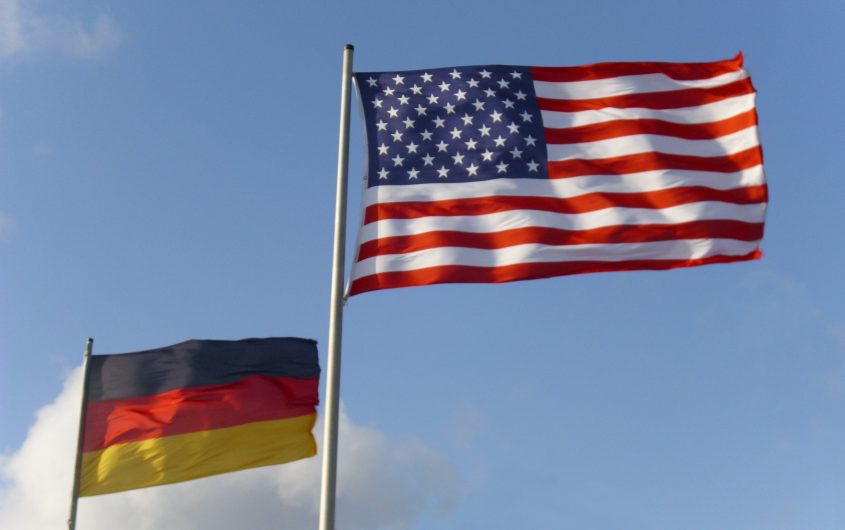
Why Americans Should Care About the 2021 German Elections

Nele Marianne Ewers-Peters
Maastricht University
Dr. Nele Marianne Ewers-Peters is a DAAD/AGI Research Fellow in Fall 2025.
Dr. Nele Marianne Ewers-Peters is Assistant Professor for European Security at the Faculty of Arts and Social Sciences (FASoS) at Maastricht University, the Netherlands. Her research is at the intersection of European security and global governance. She is particularly interested in examining transatlantic security cooperation with a focus on the EU-NATO relationship. Previously, she was Lecturer at Helmut Schmidt University of the Federal Armed Forces in Hamburg, Germany, and DAAD Postdoctoral Research Fellow at Johns Hopkins School of Advanced International Studies (SAIS) in Washington, DC. Nele holds a doctorate from the University of Kent and degrees from the University of Bath and University of Bremen.
Nele’s research project at AGI explores the rationales and objectives behind states’ decision to initiate and establish so-called minilateral security cooperation (MSC) frameworks alongside existing multilateral security organizations such as NATO and the European Union. While multilateral organizations have faced increasing pressures and contestations as well as political deadlocks and bureaucratic obstacles, states have opted for alternative forms of security cooperation. Her project thus seeks to examine and compare the approaches to establishing MSC by Germany and the United States.
Her research has been published with the British Journal of Politics and IR, Defence Studies, European Security, and German Politics. Nele is the author of Understanding EU-NATO Cooperation: How Member States Matter (Routledge, 2022) and co-editor of NATO 2030: Towards a New Strategic Concept and Beyond (Brookings, 2021).
In about two weeks, 60.4 million Germans will head to the polls to elect the new Bundestag and to determine the incoming chancellor. After sixteen years, Angela Merkel will see the end of her era. While Merkel was once dubbed the last defender of the Western liberal world, the relationship between Germany and the United States has gone through different phases full of estrangement, tensions, rapprochement, and reconnection. According to the 2020 Pew Research Center’s study on the German-U.S. relationship and their respective views of each other, it has become evident that both sides of the Atlantic diverge in their perception of the transatlantic relationship. While 75 percent of Americans see the relationship as “good,” only 34 percent of Germans are of the same opinion. In contrast, many Germans followed closely the campaign and outcomes of the 2020 U.S. election, and many were concerned about another term for Donald Trump. Not only Germany, but Europe as a whole saw with great relief—and high hopes—the election of Joe Biden as U.S. president.
Since Americans have such a positive view of Germans and the United States’ relationship with Germany, one would expect a certain interest in the country’s domestic politics. Interestingly, however, browsing through major U.S. news outlets such as the New York Times, Washington Post, Wall Street Journal as well as ABC, CNN, and Fox News, the 2021 German election coverage is limited. This interest in the election campaigns in Europe’s biggest economy and the United States’ main trading partner in Europe thus does not seem to be shared by Americans. The U.S. news is currently dominated by the recent happenings in Afghanistan, the damages caused between New Orleans and New York by Hurricane Ida, and, not surprisingly, the increase of COVID-19 cases across the country. There are about two weeks until the German elections take place on Sunday, September 26, 2021. This provides the time and opportunity to recap what the main German political parties say about the transatlantic relationship and Germany’s future in NATO, and, above all, why Americans should care about the election outcomes more than ever.
German Political Parties and the Transatlantic Relationship
The political parties’ manifestos outline the future direction of the incoming German government. As has been the tradition, the next government will be formed by a coalition of at least two parties. Not every party agrees on transatlantic relations, the German-U.S. partnership, and the role of NATO.
As the heir of Merkel, Armin Laschet and the Christian Democratic Party (CDU) in combination with the Bavarian Christian Social Union (CSU) seek to foster the transatlantic partnership particularly with the United States and see Joe Biden as Germany’s key ally in defending the rules-based international order. Their focus is set on close cooperation on international trade, health, technology, and climate change. As the main contender, the Social Democratic Party (SPD) led by chancellor candidate Olaf Scholz seeks to continue the cooperation with the United States in areas such as security and defense, close collaboration in trade, global health, and arms control, and strengthening the partnership on values and democracy. Both the CDU and SPD are strong supporters of NATO and close cooperation with their transatlantic allies. With the increasing interest in environmental issues and climate change, the Greens (Bündnis 90/Die Grünen) have pushed themselves to center stage for the race to the chancellery. Once heralded in issues such as human rights, social standards, and environmental protection, they seek to foster cooperation with the United States and European partners to fight for fair and sustainable trade. Despite their timid approach to security policy at first, the Greens have committed themselves clearly to NATO and transatlantic security and defense.
Different coalition constellations have been in recent debates, be it the traffic light (SPD, FDP, Greens), the Jamaica coalition (CDU, FDP, Greens), or the R2G coalition (SPD, Left, Greens). Whichever party has the highest chance to win the elections—currently, the SPD is leading with 24.9 percent, followed by the CDU/CSU with 20.7 percent, and the Greens with 16.5 percent—there is no way around forming a coalition. Either the Left or Free Democratic Party (FDP) will be needed. While the FDP is the only party among the two with a clear commitment to strengthening U.S.-German relations and a strong role for Germany in NATO, the Left is convinced that the current U.S. and EU foreign policies are heading into a new Cold War with both China and Russia. Consequently, the Left would want Germany to stop arms exports and withdraw the Bundeswehr’s troops from any deployments, and they call for NATO to be dissolved. The Alternative for Germany (AfD), in contrast, wants Germany to focus on its national interests by rejecting foreign policy cooperation and coordination through the EU. Vis-à-vis the United States and NATO, it sees the Alliance as a purely defensive alliance and wants the transatlantic relationship to be on eye-level by lifting all U.S. sanctions against Germany. Even though the AfD’s view on the partnership with the United States and NATO sounds in line with those of the other political parties, all of them have already rejected a coalition with the populist right party.
Why the United States Should Care
Whatever the constellation of the new coalition government, a big change in Germany’s foreign policy is unlikely. However, as the recent tensions over the military withdrawal from Afghanistan have shown, the relations between the United States and Germany under the Biden administration are still not all that rosy. The question is, what is at stake for the United States? And why should Americans care about the election outcome?
As Europe’s biggest economy and against the backdrop of the EU’s many crises—ranging from the remnants of the economic crises, the migration and refugee crisis, the democracy crisis, and the public health crisis—the to-do list for Germany at home is getting longer and longer. To avoid increasing frustration, Americans and the U.S. government should pay closer attention to the political developments in Europe and Germany. With the election of Joe Biden, Europe was hopeful to have its most important partner back on track. But this interest and benefit must be mutual. The United States and Germany are close partners in defending liberalism, democracy, and human rights. Climate change has become the newest addition to this list. This partnership is also reflected in their international engagements in conflicts. While 34,000 U.S. troops are stationed across the country, Germany followed the United States in the fight against global terrorism and was among the major troop contributors in Afghanistan. Even more, Germany is one of the United States’ major trading partners, and in 2019, Germans invested about $522 billion in foreign direct investment in the United States. Not only with their historic ties, but more importantly as the United States’ main European trading partner and key ally in the liberal world, the outcome of the 2021 German elections also matters for Americans.








